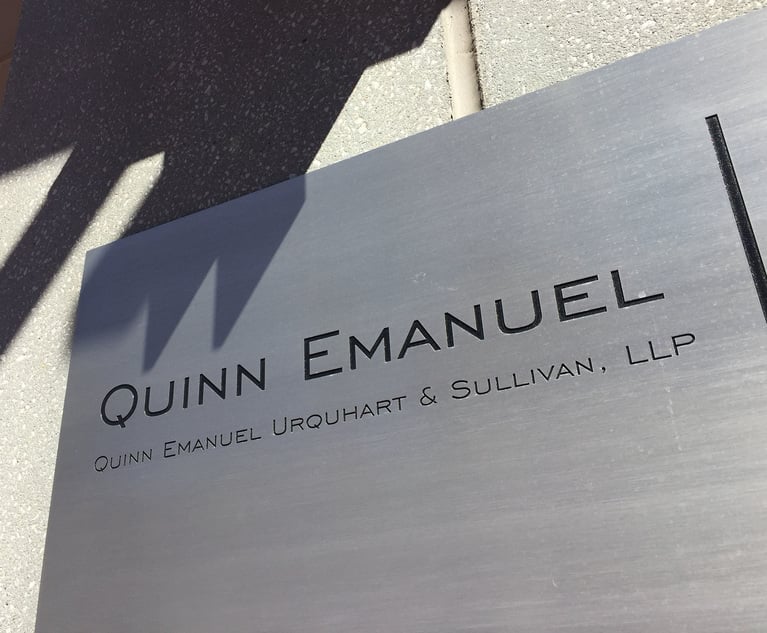Home Depot Case Could Move 'Tons of Individual Cases' to Federal Court, Public Justice Lawyer Says
The case before the U.S. Supreme Court on Tuesday asks the question: Can a third-party counterclaim defendant remove a class action under the Class Action Fairness Act?
January 14, 2019 at 02:52 PM
5 minute read
 F. Paul Bland Jr. (Photo/Diego M. Radzinschi/ALM)
F. Paul Bland Jr. (Photo/Diego M. Radzinschi/ALM)
On Tuesday, the U.S. Supreme Court hears oral arguments in Home Depot USA v. Jackson, the latest case to involve class action procedures. The case asks the question: Can a third-party counterclaim defendant remove a class action under the Class Action Fairness Act? There is a fair amount of amicus support on both sides, including the U.S. Chamber of Commerce and the American Association for Justice.
On appeal, Home Depot hopes to reverse a 2018 decision by the U.S. Court of Appeals for the Fourth Circuit that upheld an order remanding the case to state court. Home Depot had removed the case to federal court under the Class Action Fairness Act.
Paul Bland, executive director of Public Justice, represents George Jackson, who brought the counterclaims against Home Depot in the case, originally filed as a debt collection action against him by Citibank. It's Bland's second oral argument before the U.S. Supreme Court. Home Depot Associate General Counsel Will Barnette will argue for the other side.
Bland talked to Law.com about the case.
NLJ: When was the last time you argued before the U.S. Supreme Court?
Paul Bland: I've only argued one case before. I lost the Buckeye Check Cashing v. Cardegna case in 2005. Chief Justice Roberts was there, but [Samuel] Alito was still in the confirmation process when I argued, so it was a different court.
How have you been preparing?
Paul Bland: I've been reading the cases cited in our brief, reading through the briefs, doing three moot courts. I've got a team of three people who worked on the brief here, and the principal authors of it, and we've been sitting down and talking through possible cases and coming up with different lines of attack.
What is this case about?
Paul Bland: This case is essentially a scam where somebody goes to Home Depot, and Home Depot outfits come up to them and say, “Where do you live? That area has some dangerous water problems. We'd like to come over and test your water.” They do the test, and the test always shows the water is problematic. They sell them a $9,000 system. They set you up with financing through Citibank, and they tell you the financing will be free for the first two years and, if you refer people to Home Depot, they will cut the price down to $0. It turns out the referrals don't work out the way it's promised, financing is significantly more expensive, and you don't get the paperwork on the financing until the water treatment system is installed.
Give us a rundown of what happened in this case that landed it before the U.S. Supreme Court.
Paul Bland: Citibank brought a debt collection action against Mr. Jackson. He filed a counterclaim against Citibank and filed counterclaims against Home Depot and Carolina Water Services. There are 286 people in the case. This is a case almost entirely on behalf of North Carolina residents, all of which took place in North Carolina and one of the principal defendants is in North Carolina.
The arguments appear to be a conflict between Home Depot's use of the Class Action Fairness Act of 2005 and the plaintiffs' reliance on a 1941 decision by the U.S. Supreme Court called Shamrock Oil & Gas Corp. v. Sheets. That ruling found plaintiffs could not remove counterclaims against them to federal court, but this case concerns a defendant.
Paul Bland: Shamrock, in this case, only governs Citibank's lawsuit against Mr. Jackson. But there are more than 75 district court cases that also say Shamrock includes counterclaim defendants. Essentially, what Home Depot is trying to do is get the Supreme Court to overturn these dozens and dozens of district court and sometimes circuit court opinions and say Shamrock has a different meaning.
Why is this case so important to the plaintiffs?
Paul Bland: If you change around the word “defendant” so it covers third-party defendants, then all of a sudden nearly every sizable personal injury case or products liability case would be easy to force in federal court and get out of state court. Home Depot's cert petition talked only about CAFA. But the Supreme Court added a second question: Do we need to broaden what the basic removal statute says? If Home Depot wins this case based on the basic removal statute, that's going to open up tons of individual cases to federal jurisdiction. That's where the practical significance of this case is.
Home Depot and its amicus supporters portray this as another procedural tactic used by plaintiffs, this time to avoid federal court. Given that the U.S. Supreme Court has embraced such views about other procedural matters, like in its 2017 decision Microsoft v. Baker, are you concerned about your chance of success?
Paul Bland: It's certainly concerning they'll view it that way. I'm definitely worried that Home Depot is throwing a lot of mud, saying this was a clever plaintiff's lawyer trick of Mr. Jackson hoping he'd get scammed out of $9,000 to he could bring a class action. That's not what happened here. The idea that it's a compulsory counterclaim is a central part of our argument.
This content has been archived. It is available through our partners, LexisNexis® and Bloomberg Law.
To view this content, please continue to their sites.
Not a Lexis Subscriber?
Subscribe Now
Not a Bloomberg Law Subscriber?
Subscribe Now
NOT FOR REPRINT
© 2025 ALM Global, LLC, All Rights Reserved. Request academic re-use from www.copyright.com. All other uses, submit a request to [email protected]. For more information visit Asset & Logo Licensing.
You Might Like
View All
Private Equity Giant KKR Refiles SDNY Countersuit in DOJ Premerger Filing Row
3 minute read
Skadden and Steptoe, Defending Amex GBT, Blasts Biden DOJ's Antitrust Lawsuit Over Merger Proposal
4 minute read
Quinn Emanuel Files Countersuit Against DOJ in Row Over Premerger Reporting
3 minute read
Read the Document: DOJ Releases Ex-Special Counsel's Report Explaining Trump Prosecutions
3 minute readTrending Stories
- 1Paul Hastings, Recruiting From Davis Polk, Continues Finance Practice Build
- 2Chancery: Common Stock Worthless in 'Jacobson v. Akademos' and Transaction Was Entirely Fair
- 3'We Neither Like Nor Dislike the Fifth Circuit'
- 4Local Boutique Expands Significantly, Hiring Litigator Who Won $63M Verdict Against City of Miami Commissioner
- 5Senior Associates' Billing Rates See The Biggest Jump
Who Got The Work
J. Brugh Lower of Gibbons has entered an appearance for industrial equipment supplier Devco Corporation in a pending trademark infringement lawsuit. The suit, accusing the defendant of selling knock-off Graco products, was filed Dec. 18 in New Jersey District Court by Rivkin Radler on behalf of Graco Inc. and Graco Minnesota. The case, assigned to U.S. District Judge Zahid N. Quraishi, is 3:24-cv-11294, Graco Inc. et al v. Devco Corporation.
Who Got The Work
Rebecca Maller-Stein and Kent A. Yalowitz of Arnold & Porter Kaye Scholer have entered their appearances for Hanaco Venture Capital and its executives, Lior Prosor and David Frankel, in a pending securities lawsuit. The action, filed on Dec. 24 in New York Southern District Court by Zell, Aron & Co. on behalf of Goldeneye Advisors, accuses the defendants of negligently and fraudulently managing the plaintiff's $1 million investment. The case, assigned to U.S. District Judge Vernon S. Broderick, is 1:24-cv-09918, Goldeneye Advisors, LLC v. Hanaco Venture Capital, Ltd. et al.
Who Got The Work
Attorneys from A&O Shearman has stepped in as defense counsel for Toronto-Dominion Bank and other defendants in a pending securities class action. The suit, filed Dec. 11 in New York Southern District Court by Bleichmar Fonti & Auld, accuses the defendants of concealing the bank's 'pervasive' deficiencies in regards to its compliance with the Bank Secrecy Act and the quality of its anti-money laundering controls. The case, assigned to U.S. District Judge Arun Subramanian, is 1:24-cv-09445, Gonzalez v. The Toronto-Dominion Bank et al.
Who Got The Work
Crown Castle International, a Pennsylvania company providing shared communications infrastructure, has turned to Luke D. Wolf of Gordon Rees Scully Mansukhani to fend off a pending breach-of-contract lawsuit. The court action, filed Nov. 25 in Michigan Eastern District Court by Hooper Hathaway PC on behalf of The Town Residences LLC, accuses Crown Castle of failing to transfer approximately $30,000 in utility payments from T-Mobile in breach of a roof-top lease and assignment agreement. The case, assigned to U.S. District Judge Susan K. Declercq, is 2:24-cv-13131, The Town Residences LLC v. T-Mobile US, Inc. et al.
Who Got The Work
Wilfred P. Coronato and Daniel M. Schwartz of McCarter & English have stepped in as defense counsel to Electrolux Home Products Inc. in a pending product liability lawsuit. The court action, filed Nov. 26 in New York Eastern District Court by Poulos Lopiccolo PC and Nagel Rice LLP on behalf of David Stern, alleges that the defendant's refrigerators’ drawers and shelving repeatedly break and fall apart within months after purchase. The case, assigned to U.S. District Judge Joan M. Azrack, is 2:24-cv-08204, Stern v. Electrolux Home Products, Inc.










